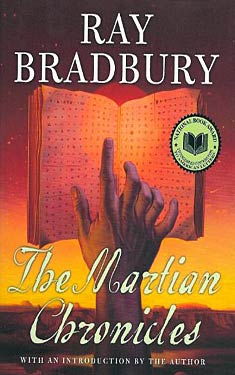Ray Bradbury
Completed 4/13/2020,
Reviewed 4/13/2020
5 stars
I first read
this book in high school. I think it was
my second adult science fiction novel, after “2001: A Space Odyssey”. I couldn’t believe how good it was. It fit into the paranoid apocalyptic vision I
had of the world, that is, leaving Earth for Mars because of the possibility of
atomic war. I read it again about
fifteen or so years ago. I had a better
appreciation for science fiction at that point, but still hadn’t read any other
Bradbury. Again, I found it a brilliant
collection of short stories, creating a depressing vision of the future. Now, I’ve read it again, this time as an
ancillary book for book club, sort of an ad hoc selection of a few people
online looking to read something while our original April selection is postponed
until the pandemic is over. For a third
time, I loved it. I have read some
Bradbury since, mostly short stories. I
love his short stories. I think that’s
where Bradbury really excels. And to
have a collection of short stories woven into a pseudo-novel is Bradbury at his
best.
 The book recounts
America’s attempts at colonizing and settling Mars. One could call to mind the discovery and
settling of the New World while reading this.
There are multiple attempts before people survive on the Mars, the
indigenous Martians are wiped out by a virus, and then it is settled like the
Old West. All this is done under the
shadow of atomic war. It should be noted
that this book was first published in 1950.
So we had just come out of World War II and were entering the Cold
War. There is definitely a ‘50s feel to
the novel. In that way, it’s pretty
dated, particularly with his treatment of women. They are all housewives or sex objects. The towns that spring up all have a “Leave It
to Beaver” feel to them. In terms of
race, the only African-American characters are in the story where all the black
people leave to go to Mars. It is chock
full of racist epithets used by the racist white people in the story. This story was censored from the latest
edition because of the language.
The book recounts
America’s attempts at colonizing and settling Mars. One could call to mind the discovery and
settling of the New World while reading this.
There are multiple attempts before people survive on the Mars, the
indigenous Martians are wiped out by a virus, and then it is settled like the
Old West. All this is done under the
shadow of atomic war. It should be noted
that this book was first published in 1950.
So we had just come out of World War II and were entering the Cold
War. There is definitely a ‘50s feel to
the novel. In that way, it’s pretty
dated, particularly with his treatment of women. They are all housewives or sex objects. The towns that spring up all have a “Leave It
to Beaver” feel to them. In terms of
race, the only African-American characters are in the story where all the black
people leave to go to Mars. It is chock
full of racist epithets used by the racist white people in the story. This story was censored from the latest
edition because of the language.
The form of
the books is like a journal, or well, chronicle. The stories are headed by dates. It takes us from 1999 to 2026. (In a more recent edition, the dates were
advanced to be “in the future” again) There
are short stories and these are connected with very short entries of a page or
less. Sometimes there’s one, sometimes
two of these really brief passages. It’s
a really clever way to create an overarching narrative for short stories that
are only mildly connected.
I can’t say
I really liked many of the characters.
They are mostly good examples of colonization mindset that settled the
New World. The characters are unsettling
at best (hmm, I guess pun intended).
There’s one story, “--And the Moon Be Still as Bright”, concerning the
fourth expedition, where most of the men on the spaceship are raucous idiots,
shooting up the abandoned Martian cities, abandoned due to the unintentional
genocide. There’s one character,
Spender, an archeologist who has respect for the remains of the Martian
culture, who goes nuts because of his conflict with his idiot crewmates. He’s somewhat likeable, despite how he acts
out. There are also some characters in
later stories that are almost likeable, but they are pretty sad people. It makes the whole novel a particularly sad,
emotional affair.
I give this
book five stars out of five. I felt really
emotional while reading it, feeling everything from anger to frustration to
despair. It’s probably not a great book
to read if you are feeling down from being in isolation due to the coronavirus
pandemic, which we are in as of this writing.
But I do think it’s pretty brilliant, especially for its time. One could probably argue that Kim Stanley
Robinson’s Mars series is better, but I would argue it’s a whole different
beast, written when we know more about Mars, and lots more about sending lots
of people into space. Despite feeling
pretty down at the end of the book, I’m pretty happy to have read it a third
time, something I probably won’t do with Robinson’s books.
No comments:
Post a Comment